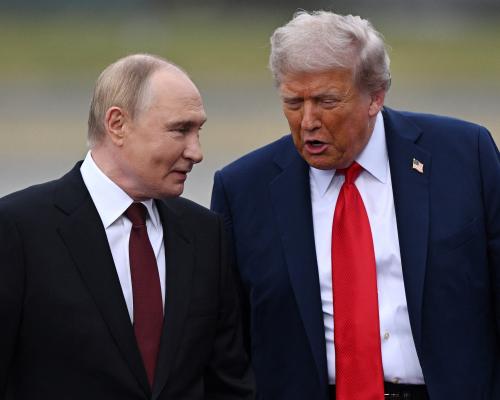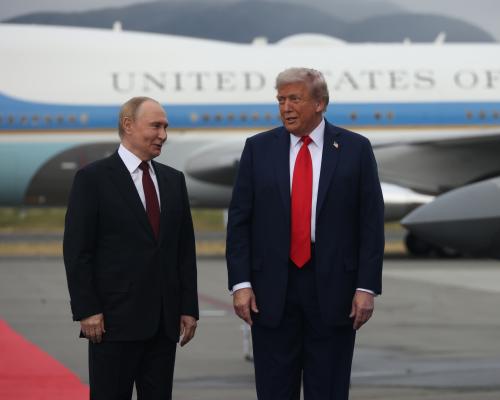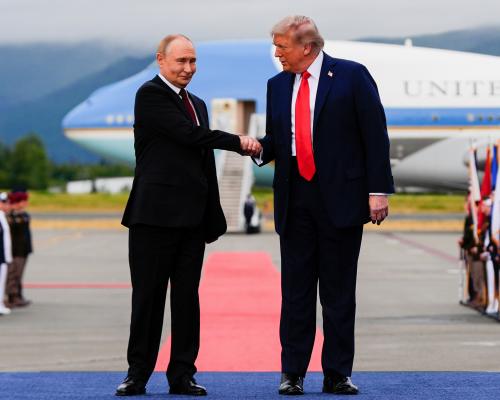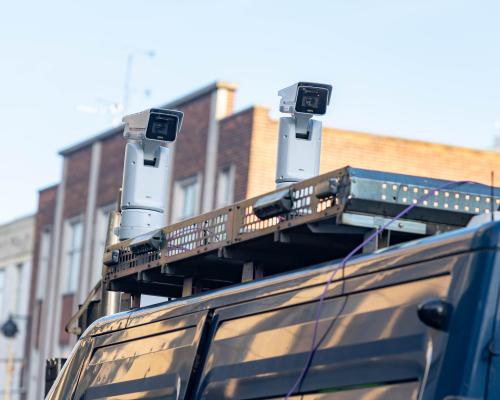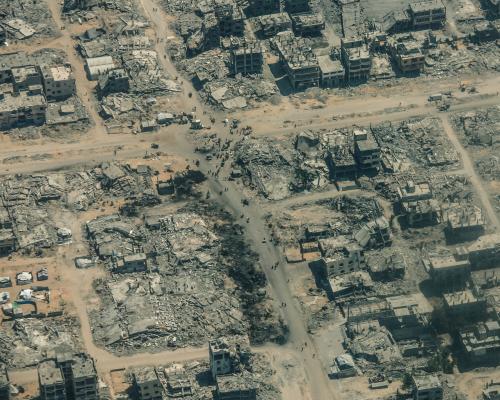
Good morning.
Seen from the air, Gaza looks like the ruins of an ancient civilization, brought to light after centuries of darkness. A patchwork of concrete shapes and shattered walls, neighborhoods scattered with craters, rubble and roads that lead nowhere. The remnants of cities wiped out.
The Guardian was granted permission on Tuesday to travel onboard a Jordanian military aircraft providing aid. Israel announced last week that it had resumed coordinated humanitarian airdrops over Gaza, following mounting international pressure over severe shortages of food and medical supplies, which has reached such a crisis point that a famine is now unfolding there.
The flight offered not only a chance to witness three tonnes of aid – far from sufficient – dropped over the famine-stricken strip but also a rare opportunity to observe, albeit from above, a territory that has been largely sealed off from the international media since 7 October 2023 and the subsequent offensive launched by Israel.
-
Why was this opportunity so rare? Following the Hamas-led attacks that day, Israel has barred foreign journalists from entering Gaza – an unprecedented move in the history of modern conflict, marking one of the rare moments that reporters have been denied access to an active war zone.
Hiroshima anniversary: mayor says Ukraine and Middle East crises show world ignoring nuclear ‘tragedies’
The mayor of Hiroshima has led calls for the world’s most powerful countries to abandon nuclear deterrence, at a ceremony to mark 80 years since the city was destroyed by an American atomic bomb.
As residents, survivors and representatives from 120 countries gathered at the city’s Peace Memorial Park on Wednesday morning, Kazumi Matsui warned that the conflicts in Ukraine and the Middle East had contributed to a growing acceptance of nuclear weapons.
“These developments flagrantly disregard the lessons the international community should have learned from the tragedies of history,” he said.
-
What else did he say? Despite the global turmoil, he said, “we, the people, must never give up. Instead, we must work even harder to build civil society consensus that nuclear weapons must be abolished for a genuinely peaceful world.”
Epstein scandal broadens as trove of letters from famous figures published
The long-running scandal surrounding the disgraced late financier and convicted sex offender Jeffrey Epstein broadened on Tuesday after the New York Times published a trove of previously unseen letters to Epstein from numerous powerful figures as well as unseen photographs from inside his Manhattan mansion.
The letters, written to Epstein by a number of high-profile individuals, were reportedly compiled as a birthday gift for his 63rd birthday in 2016. Their publication comes amid intense speculation around Donald Trump’s ties to Epstein.
In a letter from Woody Allen, the film-maker reminisced about Epstein’s dinner parties at his Upper East Side townhouse. He described the dinners as “well served” by “several young women”.
-
Why is there so much interest in Epstein again? The renewed scrutiny into Epstein’s case comes as Trump and members of his administration had repeatedly vowed to release information related to the investigations. But in July, the administration reversed course, prompting bipartisan outrage.
In other news …
-
A nuclear submarine base in Russia’s remote far east region was damaged last week after one of the most powerful earthquakes to hit the area in decades, the New York Times reported on Monday, citing satellite images.
-
The US senator John Cornyn of Texas has asked the FBI to aid Texas law enforcement in locating and arresting Democrats who left the state to forestall a plan to aggressively redraw the state’s electoral map to give Republicans an advantage.
-
The New Zealand air force has evacuated three people from a US research base in Antarctica in a high-risk operation that required navigating through extreme weather and round-the-clock darkness.
Stat of the day: RFK Jr’s health department to halt $500m in mRNA vaccine research
The US Department of Health and Human Services said on Tuesday it would terminate 22 federal contracts for mRNA-based vaccines, questioning the safety of a technology credited with helping end the Covid pandemic and saving millions of lives. In total, the affected projects are worth “nearly $500m”.
Don’t miss this: My travels in Trump’s Florida
Is the US in a new gilded age of inequality? On a 400-mile journey from a triumphant conservative youth summit to a hastily constructed immigration detention center, the answer became clearer, writes Oliver Laughland. Read his take on Maga superstars, gen Z Republicans – and the shame of “Alligator Alcatraz”.
… or this: What is the prime bedtime for your health and happiness?
According to a survey, the average American heads to bed at 10.36pm, falling asleep 42 minutes later. Many younger people opt for lights out at 9pm. Are they all missing out on uplifting and restorative late-night fun?
Climate check: Chemical pollution a threat comparable to the climate crisis, scientists warn
Chemical pollution is “a threat to the thriving of humans and nature of a similar order as climate change” but decades behind global heating in terms of public awareness and action, a report has warned. The industrial economy has created more than 100m “novel entities”, or chemicals not found in nature, the report says.
Last Thing: OpenAI stops ChatGPT from telling people to break up with partners
ChatGPT will not tell people to break up with their partner and will encourage users to take breaks from long chatbot sessions, under new changes to the artificial intelligence tool. OpenAI, ChatGPT’s developer, said the chatbot would stop giving definitive answers to personal challenges.
Sign up
First Thing is delivered to thousands of inboxes every weekday. If you’re not already signed up, subscribe now.
Get in touch
If you have any questions or comments about any of our newsletters please email newsletters@theguardian.com

